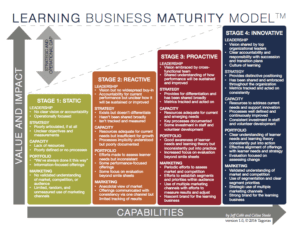Most organizations in the business of lifelong learning have a good handle on how to staff when it comes face-to-face education but when it comes to how to staff online learning, it can be whole different ballgame.
And having the proper knowledge and human resources are essential if you want to succeed in adding to or expanding your learning business.
In this episode of the Leading Learning podcast, Celisa and Jeff talk about how to staff online learning—specifically platform, content, and business development positions—including why each is important, what skills you’ll want to look for in the person that fills each role, and resources to help you along the way.
To tune in, just click below. To make sure you catch all of the future episodes, be sure to subscribe by RSS or on iTunes. And, if you like the podcast, be sure to give it a tweet!
Listen to the Show
Read the Show Notes
[00:18] – A preview of what will be covered in this podcast where we discuss staffing for online education businesses.
[00:29] – Thank you to YourMembership, the podcast sponsor for the third quarter of 2017. YourMembership’s learning management system is specifically designed for professional education with a highly flexible and intuitive system that customizes the learning experience. YourMembership’s LMS seamlessly integrates with key systems to manage all of your educational content formats in one central location while providing powerful tools to create and deliver assessments, evaluations, and learning communities.
[01:03] – Highlighted Resource of the Week – A sample job description for a learning technology manager role.
[01:32] – This episode is focused on staffing for on online education in particular because this is where we tend to get questions.
Note that the resourcing and staffing questions tie to the Capacity domain of our Learning Business Maturity Model.

The Capacity domain deals with questions about whether your organization has sufficient capacity, in terms of human resources and technology, in order to pursue the vision and strategy effectively.
To be a Stage 4: Innovative learning business—and really even a Stage 3: Proactive learning business—you have to have the right human resources in place, both in terms of leadership and line positions, and it’s line positions that we’re going to focus on in this episode—the positions that help execute on the strategy that leaders make sure is in place.
Platform
[04:21] – It’s s important to have a person focused on managing your LMS or other type of learning platform to make sure you’re getting the return from it that you should.
Note that this is not a high tech position and can be an entry-level position in many cases. The person mostly needs comfort with Web technologies, good organizational skills, and attention to detail.
[06:18] – When looking for someone to manage a learning platform for your organization, their responsibilities typically fall into three big categories as outlined below:
- General administrative tasks
- Provide general support to online learners, including, helping with e-commerce/registration/enrollment questions, computer issues interfering with the learners’ ability to complete the course, and general inquiries about the course organization and makeup.
- Run/review periodic reports.
- Support the efforts to get content into the platform—that might be uploading a SCORM course, resource documents, “seed” threads for discussions, and other materials.
[09:08] –
- Tasks specific to particular learning activities
- Monitor any course-related discussion boards or e-mail accounts to ensure that questions are being addressed by helping instructors and staff stay on top of community-generated questions and content related to courses.
- Support use of the content and course management systems by subject matter experts.
- Responsible for technical set up of webinars once the program and schedule is identified.
[10:38] –
- Ability to learn and grow
- Effectively reviews new/emerging technology solutions/trends to make recommendations.
- Collaborate with staff and subject matter experts to create, identify, or obtain new content for the learning Web site on an ongoing basis.
- Build effective relationships across the technical and content staff to ensure the best use of technologies.
Content
[12:09] – The second of type of staff position is focused on content, rather than platform.
Just as the platform position will be involved in some content aspects, similarly the content role will be involved in some platform aspects, but the ratio varies. And similar to the platform position, the content position doesn’t have to be an expert in instructional design.
Although we definitely see a need for good instructional design, there are fundamentals that can be applied and that you can teach someone to apply without an advanced degree in the field. As with the platform manager, a proven willingness and ability to learn may be better than a particular criterion.
In the area of content, you have both content designers and content developers—probably someone will come more from one side or the other, so you’ll need to understand where along the spectrum each candidate falls and where you’ll ideally want the person you hire to land.
The developer end will have people more accustomed to rolling up their sleeves and producing content.
The designer end will have people more accustomed to big-picture thinking about what goes into a curriculum and people who are more comfortable and experienced with needs analysis and working with subject matter experts to define the content for a particular learning experience.
If you need both design and development, you may need to look for two (or more) people to make sure you get both covered.
Business Development
[14:39] – eyond content and platform positions, your online learning business may need more in terms of business development and account management, particularly if you are more focused on organizational sales vs. sales to individuals.
It’s important to be thinking about institutional, organizational, and business-to-business sales if you’re getting into online education, even if you’re only focused on individual membership.
Note that one of the critical shifts highlighted in 10 Critical Shifts in the Market for Lifelong Learning, is the growing need for organizations to invest in sales skills. Specifically, it says:
In an increasingly competitive marketplace, it will be difficult for most organizations to thrive solely with retail, business-to-consumer sales of their educational products. They will need to be able to sell in quantity to other organizations (e.g., corporations, health systems, and government agencies). And they will, in many instances, benefit by being able to deliver customized (and premium-priced) solutions to these organizations. Doing this requires a level of selling skill most organizations simply don’t possess now.
[17:15] – For many organizations this work will go beyond pure selling and will merge with what would typically be characterized as business development.
A good business development person needs to know how to sell, but she also needs to be able to do more. She needs to be a steward of the overall business strategy and have the ability to actively cultivate the relationships needed for opening new distribution channels and more broadly or deeply reach organizations that have the prospective audience for your learning and education offerings.
Situations in which this level of skill is necessary include:
- Academic Relationships: Both for sourcing content and for delivery of content to college and university audiences, many organizations would benefit from creating or strengthening relationships with key academic institutions. This may mean a single, highly respected university program in your field, or it may mean tapping into the vast network of community colleges and/or technical schools in your market.
Listen to NIGP CEO Rick Grimm discuss the importance of academic relationships for his organization.
- Workforce Development: Truly having an impact on workforce development almost always means forging academic relationships, as suggested above, but it also means developing corporate and government relationships and, in general, facilitating the optimal network for connecting new and prospective employees in your industry with your learning experiences.
Listen to ASAE board chair Scott Wiley talk about the importance of workforce development.
- Health Markets: Most organizations selling to doctors, nurses, and allied health professionals would benefit from developing relationships with the range of institutions that employ these people. Most of these institutions have a need for educational content for their employees, and working with them is typically much more rapid path to reaching and impacting an organization’s target audience.
Listen to AACN CEO Dana Woods talk about the success of her organization’s ECCO program.
- International Expansion: For organizations that want to expand successfully into other countries, strong business development skills are usually not optional. The potential complexity of operating in other cultures, and often other languages, cannot be understated. At the same time, international expansion often represents a huge opportunity even for organizations that do not currently think of themselves as international. (This is another point we cover in the 10 Critical Shifts briefing.)
- Organizational Alliances: This can go back to the content question—tapping into content that you’re going to be able to get into your learning platform and having that business development person go out and make those relationships. And then distribution—you might be able to distribute the content that you’re creating for online learning through other platforms or to other organizations—but you have to have somebody who is going to focus on creating and capitalizing on those opportunities.
Those are just a handful of key areas in which a good business development person can generate significant value. We recognize that a key objection to all of this will be that most organizations don’t feel they have the budget for adding a business development person, but we would argue that most learning and education businesses that seek to thrive will ultimately do themselves more harm than good by not having someone on staff who can devote most of their time to business development.
Resources
[21:44] – Where to find potential staff and contractors and also some resources for your current staff:
For finding contractors and staff:
- Upwork.com
- Leading Learning Newsletter – free
- You can advertise with in places like the Association for Talent Development (ATD) and the eLearning Guild. Note that we’ve seen significantly less success with ASAE as a source for this—you will get a much larger pool of qualified people through the ATD and eLearningGuild.
For enhancing staff knowledge and capabilities (since you don’t necessarily have to hire to fill some of these roles):
- eLearning and the Science of Instruction by Ruth Clark and Richard Mayer
- Articulate Rapid eLearning blog
[25:11] – Wrap Up
Thanks again to YourMembership for sponsoring this episode of the Leading Learning podcast.
If you are getting value from the Leading Learning podcast, be sure to subscribe by RSS or on iTunes. We’d also appreciate if you give us a rating on iTunes by going to https://www.leadinglearning.com/itunes.
Also, consider telling others about the podcast. Go to https://www.leadinglearning.com/share to share information about the podcast via Twitter, or send out a message on another channel of your choosing with a link to https://www.leadinglearning.com/podcast.
[27:04] – Sign off
See Also:


 Learning and Development with LaTrease Garrison of ACS
Learning and Development with LaTrease Garrison of ACS
Leave a Reply